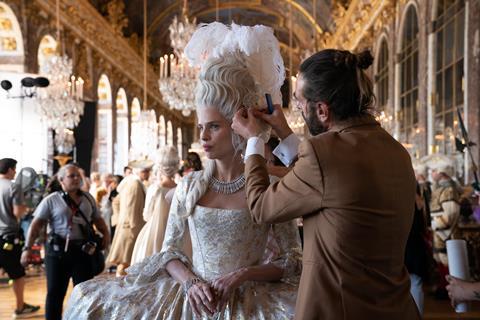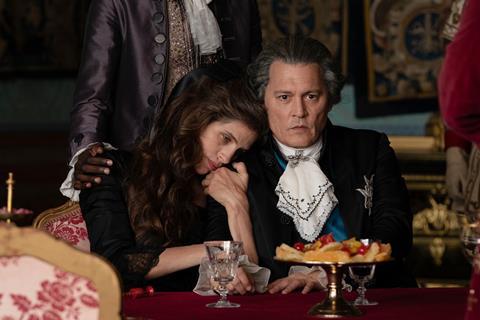French director/actor Maïwenn of Cannes opening night film Jeanne Du Barry, tells Rebecca Leffler about bringing the period drama to the biggest arthouse stage.

Cannes’ opening night film Jeanne Du Barry is a fictionalised account of the true story of its titular character, a courtesan-turned-countess who became King Louis XV’s favourite mistress and great love, sparking scandal in the 18th Century French court. The film’s director and star Maïwenn started her own fascination with Jeanne du Barry after she saw Sofia Coppola’s 2006 film Marie Antoinette. “When I saw Asia Argento as Madame du Barry, I immediately felt a complicity with her,” she says. “The more I read about her, the more it confirmed this and it hasn’t stopped.”
Diving deep into the character and time period, Maïwenn read book after book about her future protagonist, starting with Jeanine Huas’ Madame Du Barry, wanting to “know absolutely everything” about her. In addition to voracious reading, she worked with an 18th-century historian at France’s prestigious Sorbonne University, before finally settling down to write a script that put her own spin on the facts. “I took my own liberties,” says Maïwenn of her dramatised approach. “But taking liberties doesn’t mean moving away from what existed. Taking liberties means making the story one’s own and bringing it into a fictional world.”
She began working on the project in 2016, co-writing the script with Teddy Lussi-Modeste and Nicolas Livecchi and reteaming with Why Not Productions, Pascal Caucheteux and Grégoire Sorlat’s prolific Paris-based production house, which had produced her 2020 film DNA. Joining the production were Johnny Depp’s banner IN.2, La Petite Reine and France Télévisions, along with Red Sea International Film Festival. Goodfellas handles international sales.
While it is not the first time Maïwenn has acted and directed in the same film, she notes, “it is the first time I’m in a leading role and the first time there is no link between my role as a director and my character”. Her other films have had significant biographical elements, from her debut feature Pardonnez-Moi in 2006 to 2009’s All About Actress — in which she appears as herself shooting a drama — to 2011’s Polisse in which she films herself inside a child protection unit of the French police force.
As well as being a departure for the director in style and substance (not least the fact she shot it on 35mm film), Jeanne Du Barry is also a lavish period piece set in royal surroundings, something that might seem incongruous at first given Maïwenn’s outspokenness about her humble origins and rebellious spirit. “People were shocked that I was making a period film with all that implies, [and] it’s nothing like my former films,” she asserts. “But I like that people say the film looks and feels like me anyway, that they sense my signature.
“I saw facets of my own personality in Jeanne du Barry,” she adds. “I believe in freedom — I think it is what is most sexy, most seductive, most charismatic. And I’ve always loved marginal people.”
She also wanted to put her own stamp on French history and portray her heroine through another lens. “In Marie Antoinette, she’s scandalous and a tease. But in every book I read, she was described as being the complete opposite of that — distinguished, elegant, polite, altruistic, curious. I never read anything showing her to be provocative but it’s the shortcut history has taken to represent prostitutes in cinema. As if freedom could only be represented by provocation or vulgarity. Maybe it was time to contradict this idea.”
Role play

As for casting a US actor in Johnny Depp as one of France’s most cherished kings, a man who was literally known as ‘Louis the Beloved’, Maïwenn says simply, “Why him? Because I wanted to work with him. And better to be loyal to one’s desire than loyal to one’s… Frenchness.”
Maïwenn admits Depp was not an “obvious” choice, and nor was he the first — she did have discussions with two French actors before approaching the star. Even she was surprised when the top name of her list of “dream actors” accepted the role almost right away when they met in London to discuss the project.
Depp tells Screen International that “as an American, I never would have thought I’d be asked to play the king of France”. He was swayed, he says, by the script and Maïwenn’s vision of him in the role. “Regardless of the initial language barrier, Maïwenn assured me that she had seen me in this character for quite some time,” Depp says. “Receiving that sort of assurance from a director, with them showing they believe in you without condition, makes any doubts you have vanish.”
Maïwenn knew she would face some backlash back home, but she never wavered on her decision, even amid the actor’s very public legal difficulties. He lost a libel case against the UK’s The Sun newspaper for calling him a “wife beater” and then went on to win a defamation lawsuit against his ex-wife Amber Heard. in the US.
“Of course I questioned it, but I decided [the Depp/Heard case] was his private life and I couldn’t bring judgment because we saw it was one word against the other, so the best way out of it was to say, ‘It’s none of my business,’” she says, adding, “It’s a movie told by me that reflects who I am so of course there are my desires, my imperfections, things that may bother people. But it was important for me to film a king who I found to be charismatic.”
Depp’s Louis XV does not have an exorbitant amount of dialogue, but Maïwenn insists such taciturnity was in the script from the start. “I purposefully didn’t want the film to be very chatty. I wanted it to be more musical, more aesthetic.”
Depp, who worked with a dialogue coach, says he too focused more on his mannerisms. “We all know people like King Louis, who have the power to make you understand everything with just one glance. They say so much without having to open their mouths, all while instilling power, fear, lust and love. I drew inspiration from some of my heroes — silent movie stars like Lon Chaney, Buster Keaton and Charlie Chaplin. Marlon Brando was also a master at this.”
Dream team
Despite reports of on-set tension between the director and Depp, Maïwenn details a positive shooting experience. She is full of praise for her creative team, including Tom Pecheux’s make-up, John Nollet’s wig and hair design, Angelo Zamparutti’s production design, Jürgen Doering’s costume design and Stephen Warbeck’s score.
“Their solidarity was exceptional,” she says. “I felt that the entire cast and crew were ready to do anything to make me happy and they were all passionate about their unique professions.”
The story — and media attention — have focused more on Maïwenn and Depp, but the $21.7m (€20m) film also features a strong French supporting cast including Benjamin Lavernhe, Pierre Richard, Melvil Poupaud, Pascal Greggory and India Hair. It is also the screen debut of the director’s son Diego Le Fur, who plays the future Louis XVI.
On screen, the cast appear to be enjoying the opulence and decadence of la vie, but Maïwenn says that, in reality, “it wasn’t particularly fun because we were always running after time, running after daylight. We shot the entire film in just 10 weeks which is nothing, especially for a film of this scale. The scene where I’m running through the halls of Versailles in my big dress — I could only do one take.”
The director was chasing time until the end, still in post up to the 11th hour before the start of the festival, focused on editing and sound mixing instead of “what I’ll be wearing up the red carpet steps”.
Cannes regular
Maïwenn has had strong showings at previous Cannes editions. From 2011’s Polisse, which won the jury prize that year, and in 2015 with My King, which earned a best actress prize for Emmanuelle Bercot. Returning to Cannes this year, out of Competition, she says, “is different, it’s always different, each film represents a different chapter”. The fact the film has a day-and-date release in French theatres via Le Pacte is also an allure. “All of my other films premiered in May, then weren’t released until the fall. Now, I can turn the page more quickly,” she says.
The real Jeanne du Barry was executed in 1793 during the French Revolution, but Maïwenn is hoping for a happier ending for her version of history. “What would bring me the most pleasure is for audiences to say, ‘I didn’t know the story of Jeanne du Barry and I learned things.’ One of the main reasons I wanted to make a film about her was to make her known.”
The spotlight ahead of the film’s premiere shifted to the off-screen scandal when the director was accused of — and later admitted to on national French television — attacking a journalist at a Paris restaurant. The petite scandale has been a timely twist to the on-screen story about a woman known for ruffling the industry establishment’s feathers. Amid the pomp and circumstance on and off the screen, at its core Jeanne Du Barry is a love story.






![The Brightest SunScreen[Courtesy HKIFF]](https://d1nslcd7m2225b.cloudfront.net/Pictures/274x183/3/5/0/1448350_thebrightestsunscreencourtesyhkiff_312678.jpg)


















No comments yet